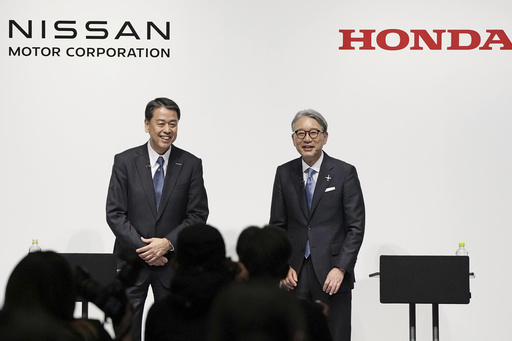BANGKOK — On Wednesday, Japanese car manufacturers Nissan Motor Corp. and Honda Motor Co. confirmed they are exploring the possibility of increased collaboration but refuted claims of a planned merger. Nissan’s stock price surged by almost 24% in Tokyo following unverified reports that indicated a possible merger with Honda, which would create the third-largest automotive group globally. In contrast, Honda’s stock experienced a decline of up to 3%. Additionally, Mitsubishi Motors Corp., a member of the Nissan alliance, is also involved in these discussions.
After trading in Nissan’s shares was halted, it resumed following a joint statement from the companies. They clarified they are “considering various possibilities for future collaboration, but no decisions have been made.” This development comes as the automotive industry faces significant disruption, particularly due to the rise of Chinese automakers.
The competition is intensifying as effective electric vehicles (EVs) from China’s BYD, Great Wall, and Nio are gaining traction, impacting the market shares of American and Japanese companies not only in China but worldwide. Japanese automakers are struggling to catch up in the EV sector and are increasingly focused on reducing costs and improving their operational efficiency.
To adapt to the rapidly changing landscape shackled by electrification, Nissan, Honda, and Mitsubishi announced plans in August to share EV components like batteries and collaborate on autonomous vehicle software research. Earlier in March, a preliminary agreement was established between Honda and Nissan, which are ranked second and third among Japanese manufacturers, respectively. If a merger were to occur, it could potentially generate a massive entity valued at around $55 billion, according to the market capitalizations of the three companies involved.
A combined effort would enable these smaller Japanese firms to scale up operations in order to compete more effectively with industry giants, such as Toyota Motor Corp. and Germany’s Volkswagen AG. In contrast, Toyota has forged technology partnerships with Mazda Motor Corp. and Subaru Corp., enhancing its competitive edge.
Analysts highlight that Honda could benefit from Nissan’s extensive offerings, which include truck-based SUVs like the Armada and Infiniti QX80—segments where Honda does not compete. These models boast significant towing capabilities and off-road performance, which could diversify Honda’s portfolio. Moreover, with Nissan’s experience in hybrid and electric vehicle technologies, it may assist Honda in accelerating its own EV and hybrid development, according to industry experts.
Despite Nissan’s electric models, such as the Leaf and Ariya, not achieving robust sales in the U.S. market, they are viewed as dependable vehicles with potential for future innovations. Nissan is preparing to roll out new models that might serve as a solid foundation for Honda’s upcoming generation of vehicles. Currently, Nissan is undergoing significant organizational changes, including a reduction of its workforce by approximately 6% and a 20% cut in production capacity, in light of a financial loss reported at 9.3 billion yen ($61 million).
Furthermore, the company has recently restructured its leadership, with CEO Makoto Uchida taking a significant pay cut to address the ongoing financial challenges, highlighting a need for enhanced efficiency amid rising costs and market demands. Fitch Ratings has downgraded Nissan’s credit outlook to “negative,” attributing the decline to profitability issues, partly arising from price reductions in North America, though it acknowledged Nissan’s stable financial structure and liquidity of 1.44 trillion yen ($9.4 billion).
Amid these developments, Nissan’s stock has drawn attention as a potential acquisition target, particularly after Foxconn, a key manufacturer in the tech space, began exploring opportunities within the electric vehicle market. Nissan’s ongoing struggles have roots in a crisis that emerged following the arrest of its former chairman, Carlos Ghosn, in late 2018 on various charges, which he denies.
Honda itself reported a nearly 20% decrease in profits during the first half of its fiscal year, struggling against declining sales in China. As the automotive landscape continues to shift, Toyota remains the dominant force, producing 11.5 million vehicles in 2023, compared to Honda’s output of 4 million and Nissan’s 3.4 million, and Mitsubishi’s output of just over 1 million. A merger, however, would still leave Toyota at the forefront of the Japanese automotive market.
Nonetheless, all major automakers are bracing for potential upheaval, especially if political tensions prompt a rise in tariffs on imports. Companies like Nissan have adjusted their supply chains accordingly, and analysts have pointed to a notable “affordability shift” among consumers who are increasingly reluctant to pay premiums for new vehicles, challenging automakers to consider more accessible pricing strategies moving forward.



